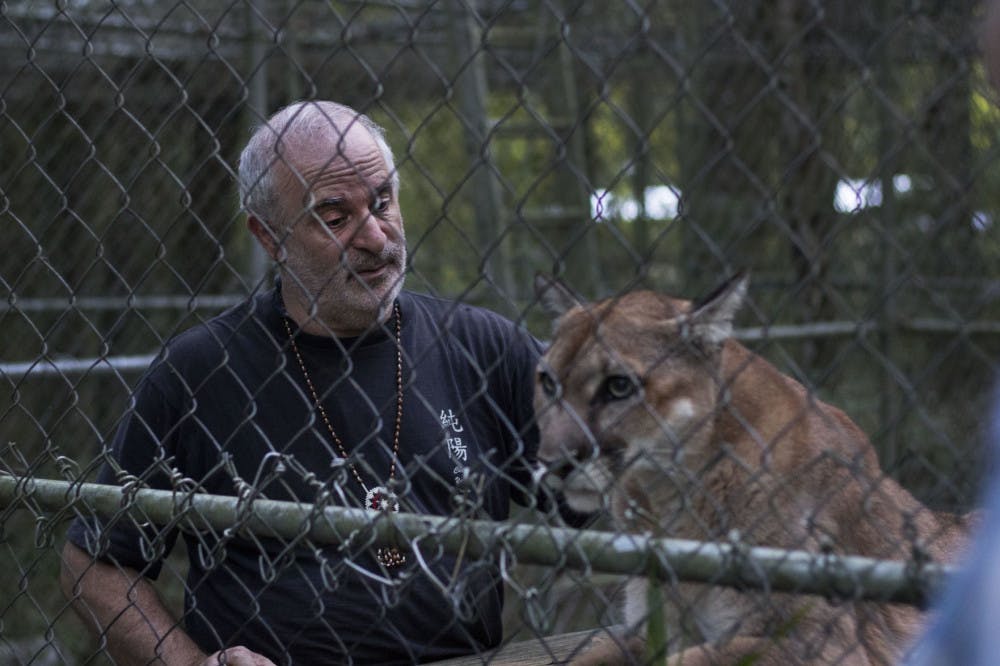To end the opening practice of the Fall semester for UF’s fencing club team, Nicholas Van Nimwigen remembers how Bruce Capin sat his group down in a circle and repeated his lifelong advice.
“How do you know you’re going to wake up tomorrow?” he said to Nimwigen and his teammates. “You have no guarantee that there's any future. Make the most of what you're living right now.”
Capin, who spent 22 years as UF’s fencing coach, died Nov. 28 at the age of 60. Under his leadership, UF fencing was more than a team or a club — it was a family.
Capin mastered all three forms of fencing — foil, epee and saber — while most who fence only master one. He taught social sciences in Compton, California, until he realized he hated teaching. Prior to coaching at UF, he coached at New Mexico State University and California State University, Long Beach. While at UF, he also helped coach Clemson University’s fencing team.
Not only was Capin adamant about shaping skilled fencers, but he also deeply cared about students’ well-being off the fencing piste. Van Nimwigen, a 21-year-old UF math junior, said Capin’s passion and commitment to the team helped students through the pandemic.
“We're not top in the nation, and we're not trying to be,” Van Nimwigen said. “But we're trying to be the best that we can be. That almost family-type environment was fostered by him.”
Velyn Wu, a 41-year-old assistant foil coach, said Capin balanced being kind-hearted and compassionate with being tough.
“On the outside, he probably seemed rough,” Wu said. “But on the inside, he was just one big, soft teddy bear. You'd never know how far he went in fencing until you talk to his friends.”
As a club program, UF’s fencing team welcomed anyone, regardless of experience. For Capin, anyone had the potential to be an amazing fencer.
Damien Lehfeldt, a 36-year-old fencing coach and referee, met Capin when he started his high school fencing career in Tampa. The two remained fencing friends for years, and Capin continued to motivate Lehfeldt even after graduation.
“I've never seen a better club coach in terms of his ability to take somebody who had never fenced in their life, and by the end of four years at the University of Florida, turn them into viable, legitimate fencers,” Lehfeldt said.
Madeline Stewart, a 21-year-old UF sustainability and political science junior, said Capin never tolerated bullying and embraced an inclusive atmosphere for the team of 50 to 60 members.
“When I first met Bruce, he really reminded me of a rough-around-the-edges coach,” Stewart said. “All he wants is for me to get better, but he's going to kind of be a jerk every once in a while. But everything came from a good place.”
Dawn Schwartz, a 28-year-old UF alumna, remembers the team’s annual trip to Temple University’s fencing tournament.
Capin would ride the bus with everyone else to ensure the team was having fun. After the tournament’s first day, he would take the team out for Philly cheesesteaks and hot chocolate.
“No matter what your background, Bruce was happy to have you on the team,” Schwartz said.
Capin told Schwartz stories about when he was younger and couldn’t afford to enter a fencing tournament and pay for a hotel. So, he would pay to fence and sleep in his car.
“He knew the struggles of college students who don't have a lot of money that want to do sports but couldn't afford to,” Schwartz said. “He made every effort that he could…to help gather the money to reduce the cost of these trips.”
Born into a Jewish family, Capin later became devoted to Native American spiritual beliefs. He would provide spiritual mantras and lessons to his students, Lehfeldt said.
“Bruce was this deeply spiritual person,” Lehfeldt said. “When you sat down for a conversation with him, it was like he was staring into your soul.”
Capin’s love for animals and nature was also well known to everyone around him. He owned two wildcats with his wife, Erika, and spent more than 20 years and about $200,000 maintaining an animal sanctuary with her, according to a 2019 edition of The Alligator.
Lehfeldt said Capin built meaningful interactions with people and animals alike. Lehfeldt remembers watching a video of Capin playing a pan flute while a cougar sat by his side and licked him.
“He treated those cats that he rescued like his own children,” Lehfeldt said.
During a national fencing event, Lehfeldt noticed Capin showed up covered in scratches, as if he were in a fight. He asked Capin what had happened.
“He turns to me, and he goes, ‘You know, I entered the cat's domain, and I didn't show it enough respect,’” Lehfeldt said. “It was just one of those insightful things that he said.”
Fencing is a small community, Lehfeldt said, but Capin made everyone feel involved and valued.
“He was the kind of guy that when he asked you how you were doing, it was not a perfunctory question,” Lehfeldt said. “It was him being genuinely invested in almost everybody that he came across.”
Contact Sophia at sbailly@alligator.org. Follow her on Twitter @sophia_bailly.
Sophia Bailly is the Fall 2024 University Editor. She interned for The Times-Picayune in Louisiana this past summer as a Capitol News Bureau reporter. When she's not reading the news, she can be found listening to podcasts, going for a run or studying Russian.






